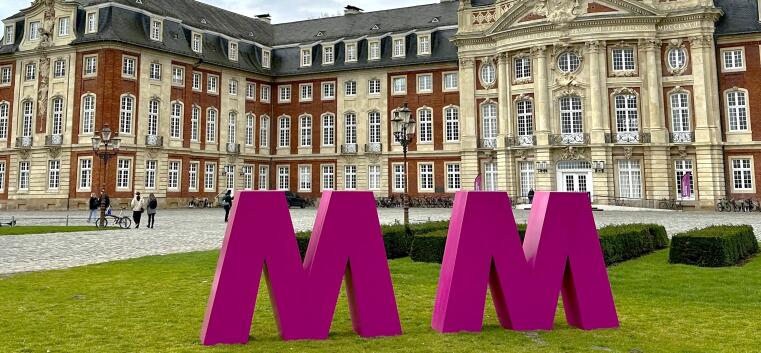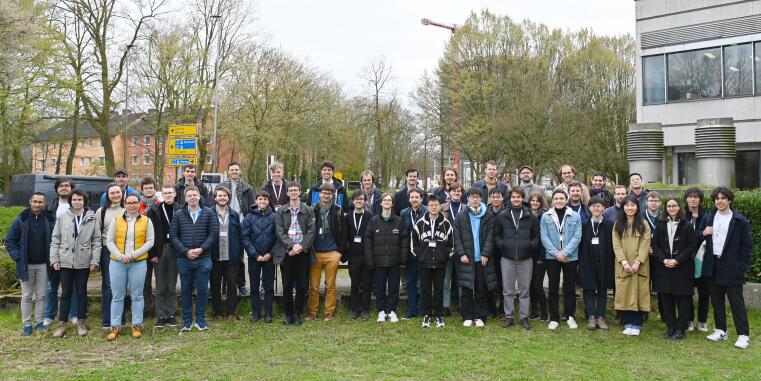
YMCN Spring School: Recent Advances in SPDEs
The YMCN Spring School: Recent Advances in SPDEs aims to bring together young researchers from the fields of Probability Theory and Partial Differential Equations (PDEs), particularly those with interests in statistical physics, quantum field theory (QFT), singular SPDEs and dispersive (S)PDEs.
The Spring School will feature four mini-courses and talks by leading mathematicians in these areas, highlighting recent breakthroughs.
Mini-courses
On the global well-posedness of singular SPDEs
The goal of these lectures is to study the global well-posedness of singular SPDEs. As a warm-up, we first prove the global well-posedness of the $\Phi^4_2$-model. We then turn to the global well-posedness of the stochastic Abelian-Higgs model, which is a stochastic geometric evolution equation. In this context, we also discuss covariant monotonicity formulas and covariant stochastic objects.
Chain rule symmetry for singular SPDEs: from multi-indices to decorated trees
In this lecture, we will introduce the chain rule symmetry for singular SPDEs after recalling the main ideas for solving singular SPDEs. We will look at this symmetry via various approaches: integration by parts, multi-indices for scalar-valued equations and decorated trees for systems. If time allows, we will show how this symmetry can be used for solving sub-critical quasi-linear equations and provide long-time existence for the specific case of space-time white noise.
Pathwise well-posedness of stochastic dispersive PDEs with multiplicative noises
In this course, we study pathwise well-posedness of stochastic nonlinear wave equations with white-in-time/coloured-in-space multiplicative noises. To give a pathwise meaning to the solutions, we look at operator-valued controlled rough paths adapted to the wave-flow. We then combine this with the Fourier restriction norm method to tackle nonlinear dynamics.
Probabilistic Yang-Mills theory
In this minicourse, I will introduce Yang-Mills theory and its connections with probability. I will start with the YM lattice measure and show how, on a formal level, it scales to continuum geometric model. I will then survey several recent results on the YM Langevin dynamic, both on the lattice and in the continuum. It turns out that the dynamic can be used to reveal new properties about the YM measure, such as exponential decay of correlations on the lattice, and sharp regularity properties in the continuum.
Invited Talks
$\Phi^4_3$ as a Markov Field
Random Fields with posses the Markov Property have played an important role in the development of Constructive Field Theory. They are related to their relativistic counterparts through Nelson Reconstruction. In this talk I will describe an attempt to understand the Markov Property of the $\Phi^4$ measure in 3 dimensions. We will also discuss the Properties of it's Generator (i.e) the $\Phi^4_3$ Hamiltonian. This is based on Joint work with T. Gunaratnam.
Higher order approximation of nonlinear SPDEs with additive space-time white noise
It has long been proposed (Davie, Gaines '01/ Jentzen, Kloeden '08), as well as observed in simulations, that approximation schemes for SPDEs with additive space-time white noise based on samples from the stochastic convolution, rather than from increments of the underlying Wiener processes, should achieve significantly higher convergence rates with respect to the temporal timestep. We prove that for a large class of nonlinearities, with possibly superlinear growth and featuring derivatives, we can improve the temporal rate by at least 1/2 compared to what is known to be optimal for schemes based on Wiener increments. The talk is based on a joint work (arXiv:2406.03058) and an ongoing work together with Ana Djurdjevac and Máté Gerencsér.
Organisers
- Fabian Höfer, University of Münster
- Sarah-Jean Meyer, University of Oxford
- Xiaohao Ji, FU Berlin
Schedule
The preliminary schedule is available via this link. The conference starts at 9:00 AM on Monday and ends at 15:30 PM on Friday.

Registration
Registration is closed.
Support
There might be a limited amount of funding available for participants.
Venue and Travel Information
The conference takes place in room SRZ 216/217 on the second floor of the seminar building (Seminarraumzentrum, SRZ) next to the Faculty of Mathematics and Computer Science and the Cluster of Excellence Mathematics Münster.
University of Münster
Seminarraumzentrum (SRZ)
Orléans-Ring 12
48149 Münster
Germany
Directions can be found on openstreetmap, on the University of Münster campus map and on the MM websites.
We have also collected practical information in a leaflet: Information for conference guests / Informationsblatt für Tagungsteilnehmer:innen [enIde]
Accommodation
You can book your hotel or hostel through Münster Marketing.
We recommend the following low-cost hotels/hostels:
| Name of hotel/hostel | Address | Webpage |
|---|---|---|
| Haus Niemann | Bentelerstr. 4, 48149 Münster | https://www.haus-niemann.de/ |
| Ibis Budget Münster | Herwarthstr. 8, 48143 Münster | https://all.accor.com/hotel/A220/index.de.shtml |
| Hotel Conti | Berliner Platz 2, 48143 Münster | https://hotel-conti-muenster.com/ |
| Hotel Martinihof | Hörsterstraße 25, 48143 Münster | https://www.martinihof.de/ |
| Sleep Station | Wolbeckerstraße 1, 48155 Münster |
https://www.sleep-station.de/ |
| Jugendgästehaus Aasee | Bismarckallee 31, 48151 Münster | https://www.jugendherberge.de/jugendherbergen/muenster/ |
| Nordstern Hostel | Hoyastraße 3, 48147 Münster | https://nordstern-hostel.de/de/ |
| Johanniter-Gästehaus Münster | Weißenburgstraße 60 – 64, 48151 Münster |
https://www.johanniter-gaestehaus.de/de/ |
Poster
You are welcome to download the poster from this page and display it at your institution.
Sponsor
The conference is supported by the Cluster of Excellence Mathematics Münster and the Münster University Internationalisation Fund.
Contact
If you have any questions please contact the organisers via ymcn.spde.muenster@gmail.com.

